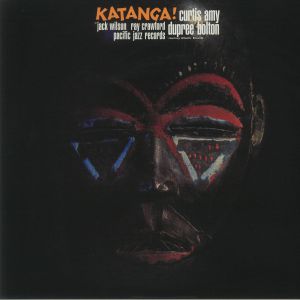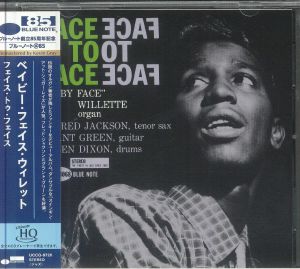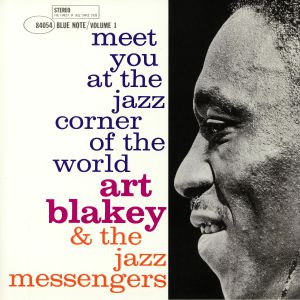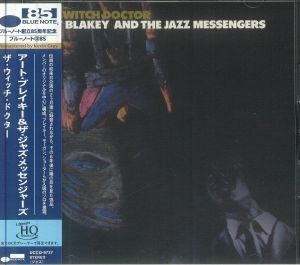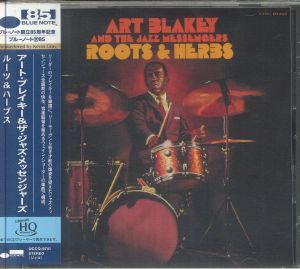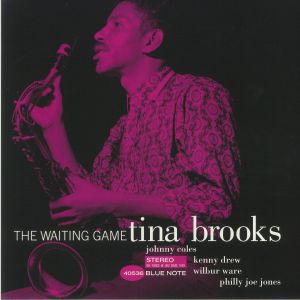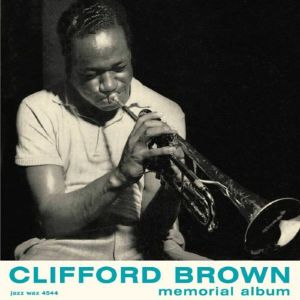Filter
Artist
Label
Release Title
Price
Tags
Back catalogue: All genres
Juno's full catalogue of All genres
Singles
Review: 2020’s acclaimed Blue Note Re:imagined project heard London duo Blue Lab Beats - producer NK-OK and multi-instrumentalist Mr DM - usher in 2021 with the EP We Will Rise and its dynamic lead single ‘Blow You Away (Delilah) feat Ghetto Boy'. Now neatly bagged up in a five-tracker EP, with collaborations with Braxton Cook, Kojey Radical, Alex Blake, and DTsoul, this one’s a heartfelt but still breezy project, laying down healing and hope in the face of racism. Reassurance and joy interlace a sound pinching motifs of boom-bap and jazz-funk, with influences from hip-hop pioneers and the African diaspora. A future-focused London bowls headlong into the future, chanting the motto 'We Will Rise’.
… Read more in stock ₺770,30
Cat: 453823 6. Rel: 29 Sep 22
Broken Beat/Nu Jazz
Review: Oscar Jerome, Oscar Worldpeace and Franc Moody have got new music coming on the latest Blue Note Re:imagined compilation this year which is already getting us hella excited. Before we hear what is sure to be a contemporary great, we get treated to a couple of singles from it on this tidy 45 rpm. Jerome Oscar & Oscar Worldpeace go first with '(Why You So) Green With Envy' which fuses jazz styles for across the age with Worldpeace's tight and thoughtful bars. On the flip side is Franc Moody with 'Cristo Redentor' which balances jazz's traditional past with its freshest future.
… Read more in stock ₺418,43
Review: Blue Note Re:imagined is a carefully curated collection of brand-new covers of classic material from the legendary label as served up by a selection of the UK scene's most exciting young talents including Ezra Collective, Nubya Garcia and Brit Award-winning Jorja Smith. For this latest 7" it's Jordan Rakei, who actually hails from Aus, but let's not get mad about that because the super smooth soul singer reaches new heights on the free flowing, heart opening 'Wind Parade'. Jazz pianist Alfa Mist takes care of the flip with a suitably cosmic exploration on 'Galaxy' that pairs live, busy drums and soaring synths with rich chords.
… Read more in stock ₺550,52
Albums
in stock ₺704,26
in stock ₺572,18
Katanga! (Tone Poet Series) (reissue) (180 gram audiophile vinyl LP)
Cat: 351492 4. Rel: 04 Jun 21
Jazz
Played by: Juno Recommends Jazz
in stock ₺1.926,28
Groovin' Blue (Tone Poet Series) (180 gram audiophile vinyl LP + insert)
Cat: 554214 5. Rel: 06 Mar 25
Jazz
Review: Human novae of the 1950s jazz circuit in Hollywood, Curtis Amy and Frank Butler imploded the local scene at the turn of the swinging decade when they began to record for local label Pacific Jazz. Laid down in a single session at the PJ studio, Groovin' Blue is a timeless and idiosyncratic experiment in jazz, its specialty being tss-tss rhythms, unhindered lead instrumental melisma, sax counterpoint, and smackout drum fills and solos from Butler, which more than transcended the strictures of the swing form of the time. Also hearing vibraphonist Bobby Hutcherson, who was just 19 years old at the time of this recording, this excellent six-song set is perfect for those audiophiles keen on the interesting intersection of blues and jazz.
… Read more in stock ₺1.562,79
in stock ₺424,25
in stock ₺550,52
Review: Fresh off their second consecutive win as "Jazz Group of the Year" in the DownBeat Readers Poll, Artemis returns with their third Blue Note album. Featuring a quintet lineup helmed by pianist and musical director Renee Rosnes, this all-female supergroup unites some of the most pre-eminent voices in modern jazz. Trumpeter Ingrid Jensen, saxophonist Nicole Glover, bassist Noriko Ueda and drummer Allison Miller bring their individual brilliance to a vibrant set of original compositions and inspired arrangements. 'The Smile Of The Snake' slithers with a captivating energy, while 'Komorebi' shimmers with delicate beauty. 'Footprints', a Wayne Shorter classic, receives a fresh and invigorating interpretation, while Burt Bacharach's 'What The World Needs Now Is Love' is transformed into a poignant ballad. From the intricate interplay of Jensen's trumpet and Glover's saxophone to the driving rhythms of Ueda and Miller, this album showcases a remarkable synergy between five exceptional musicians at the top of their game.
… Read more in stock ₺1.232,58
Swingin' At Sugar Ray's
Goin' Down
Whatever Lola Wants
Face To Face
Somethin' Strange
High 'N' Low
in stock ₺693,69
in stock ₺572,18
Review: After nearly three decades and almost 20 albums, Bill Charlap remains a paragon of jazz piano, with his trio - bassist Peter Washington and drummer Kenny Washington - standing as one of today's premier jazz groups. Their latest Blue Note release, And Then Again, recorded live at the Village Vanguard, harnesses the trio's extraordinary synergy and intuitive communication. The trio's has an unparalleled cohesion with sharp decision-making, and dynamic improvisations. The album highlights a blend of songbook classics and compositions by jazz greats, including the vibrant lead track, 'And Then Again' by Kenny Barron. Each performance moves from a calculated vision to a more spontaneous and intuitive approach. Years of critical acclaim and regular performances at the Vanguard have solidified their status, with Charlap's early experiences at the famed club fueling his passion. A thrilling and heartfelt live recording.
… Read more in stock ₺1.265,87
in stock ₺1.155,98
in stock ₺1.045,56
Review: Jazz fans are in for a real treat here as Blue Note unleash a never before heard studio album by Art Blakey & The Jazz Messengers. It was recorded back in 1959 at the legendary Rudy Van Gelder's Hackensack studio and has Lee Morgan, tenor saxophonist Hank Mobley, pianist Bobby Timmons, and bassist Jymie Merritt all playing as part of the recording. As the title suggests, it's a breezy, super cool record with seductive trumpets and icy drums all next to neat keys that encourage you to gently bop. After months of waiting, it proves more than worth all the anticipation.
… Read morePlayed by: Juno Recommends Jazz
in stock ₺990,61
in stock ₺1.155,98
Cat: 776473 9. Rel: 13 Sep 19
Jazz
in stock ₺869,62
Cat: 807387. Rel: 15 Nov 19
Jazz
in stock ₺869,62
in stock ₺748,11
in stock ₺704,26
The Chess Players
Sakeena's Vision
Politely
Dat Dere
Lester Left Town
It's Only A Paper Moon
in stock ₺748,11
in stock ₺748,11
Ping Pong
Roots & Herbs
The Back Sliders
United
Look At The Birdie
Master Mind
in stock ₺748,11
Review: Recorded during the same intense August 1960 sessions that produced another iconic album, this release showcases the brilliance of a hard-bop quintet, combining fiery improvisation with introspective ballads. The album opens with a standard tune that became a regular feature in the group's live sets, setting the stage for a collection of original compositions. Lee Morgan's 'Johnny Blue' stands out with its infectious blues line, while Wayne Shorter's compositionsiparticularly 'Sleeping Dancer Sleep On'ireveal his growing mastery of melody and complex chord changes. The track is a highlight, with lush, gospel-funky piano and a slow, stunning waltz rhythm. Shorter's 'Noise in the Attic' is a powerful drum showcase, allowing for blistering solos from the horns but placing special emphasis on the piano work. 'Giants', another Shorter composition, closes the album with a hard-bop anthem that keeps the energy high and steady throughout. While Blakey typically dominates with his high-energy drumming, here he takes a more restrained role, allowing the melodies to breathe. The synergy of the quintet is palpable, with Bobby Timmons' percussive piano providing a dynamic counterpoint to the horn lines.
… Read more in stock ₺1.155,98
Moanin' (limited 180 gram blue vinyl LP with obi-strip (indie exclusive))
Cat: 585922 8. Rel: 08 Aug 24
Jazz
Review: Art Blakey & The Jazz Messengers' Moanin' is a quintessential hard bop album that effortlessly stands out with its classic, distinctive sound. Released in 1958, this seminal record features a lineup of jazz luminaries, including pianist Bobby Timmons, saxophonist Benny Golson, trumpeter Lee Morgan, and bassist Jymie Merritt. Despite its adherence to traditional hard bop elements, the album shines with an exceptional blend of precision, enthusiasm, and depth. The title track, 'Moanin',' composed by Timmons, sets the tone with its infectious groove, while Golson's contributionsi'Along Came Betty,' 'Blues March,' and 'Are You Real?'iadd a range of emotions and rhythms, from lyrical to powerful. The standout 'The Drum Thunder Suite' shows Blakey's unparalleled drumming strength, combining dynamic rhythms and Latin influences. The album's meticulous craftsmanship ensures that every track maintains the listener's attention, offering a mix of accessible melodies and intricate musicianship. Blakey's leadership and the band's chemistry result in an album that is not only a highlight of hard bop but also a compelling entry point for jazz enthusiasts. Moanin' remains a timeless classic, celebrated for its masterful execution and enduring impact on the jazz genre.
… Read morePlayed by: Juno Recommends Jazz
in stock ₺1.639,92
First Flight To Tokyo: The Lost 1961 Recordings (limited gatefold 180 gram vinyl 2xLP + booklet + postcards)
Cat: 359528 6. Rel: 10 Dec 21
Jazz
Review: First Flight to Tokyo: The Lost 1961 Recordings is sure to be a real thrill for fans of Art Blakey and his Jazz Messengers. It is a never before rebased or heard recording of a show they played at Hibiya Public Hall in Tokyo on January 14, 1961. The group was one of the first to tour the country and enthralled caudices everywhere they played. At the time, the band was made up of Lee Morgan on trumpet, Wayne Shorter on tenor sax, Bobby Timmons on piano and Jymie Merritt on bass and for this set they performed plenty of classics such as Charlie Parker's 'Now's the Time' and Thelonious Monk's 'Round About Midnight.'
… Read more in stock ₺1.926,28
Cat: 377125 3. Rel: 04 Apr 14
Jazz
in stock ₺1.078,84
Review: Blue Note reissue the drummer Art Blakey and his Jazz Messengers' time-honoured hard bop album Mosaic, often cited as among his best. From the titular opener to the seguing montage-worthy sequences of 'Arabia', 'Crisis' or 'Down Under', we're met with huge, extruding saxes and trombones, backed by Blakey's un-pin-downable drumming, evocative of huge towering New York skylines and crowd bustle; apparently, the album was so tightly performed it needed no alternate takes.
… Read morePlayed by: Juno Recommends Jazz
in stock ₺1.100,50
Review: Sizzling-hot hip-hop duo Blue Lab Beats are on everybody's lips now, thanks at least in part to the announcement of their latest full-length album, Blue Eclipse. Heralding an exciting new era for the duo, these 12 songs reveal the depth and breadth of producer NK-OK, and multi-instrumentalist Mr DM's musical ambition. Throwing back to their debut EP 'Blue Skies', which even pre-dates their involvement with record labels, Blue Eclipse signals a circling back to their origins while also embracing the new; the pair's usual jazztronica remit is lent the utmost contemporary spin, with notes of drill, neoclassical, trap and Jersey bounce - all still prevalent styles - peeking through in these latest productions.
… Read morePlayed by: Juno Recommends Broken Beat Nu Jazz
in stock ₺1.001,71
in stock ₺424,25
in stock ₺1.232,58
Bring It Home To Me (Tone Poet Series) (gatefold 180 gram audiophile vinyl LP)
Cat: 359266 6. Rel: 01 Dec 22
Jazz
Review: American trumpeter Blue Mitchell, as his name suggests, had a sound rooted mostly in the blues. He was a Blue Note artists who recorded this album in 1966 and included in it is 'Portrait of Jennie' which was a ballad originally written for the movie Portrait of Jennie in 1948. Guests Jimmy Heath, Tom McIntosh and J. Russell Robinson all feature across the six tunes which mix up modal harmonies with some lyrical moments and groove-driven and subtly funky rhythms. It's a rare one to find on vinyl so do not sleep on this reissue.
… Read more in stock ₺1.486,18
in stock ₺693,69
Booker Little 4 & Max Roach (Tone Poet Series) (180 gram audiophile vinyl LP)
Cat: 488194 8. Rel: 03 Oct 24
Jazz
Review: The reissue of Booker Little 4 & Max Roach as part of the Tone Poet Vinyl Series is an exciting announcement for jazz fans. Booker Little, a brilliant trumpeter whose life was tragically cut short at 23, left an indelible mark on the jazz world. This 1958 album, recorded when Little was just 20, showcases his extraordinary talent both as a musician and composer. The LP features the dynamic interplay between Little and Max Roach, one of jazz's most influential drummers, along with George Coleman on tenor sax, Tommy Flanagan on piano and Art Davis on bass. It opens with a spirited rendition of Miles Davis' 'Milestones', setting the tone for the session, before the standards 'Sweet and Lovely' and 'Moonlight Becomes You' are given fresh interpretations. But the heart of the album lies in Little's original compositions: 'Rounder's Mood,' 'Dungeon Waltz,' and 'Jewel's Tempo.' These tracks highlight his inventive melodic sense and technical strength. The Tone Poet Series ensures an audiophile-quality experience, with meticulous mastering by Kevin Gray and a deluxe presentation that lives up to the highest standards.
… Read morePlayed by: Juno Recommends Jazz
in stock ₺1.375,23
in stock ₺1.188,21
Review: Extension was the last of three unique Blue Note sessions led by the singular saxophonist George Braith in the early 1960s. The album was rooted in soul jazz - with Grant Green (guitar), Billy Gardner (organ), and Clarence Johnston (drums) - but Braith's adventurous spirit led the music into unexpected realms on memorable originals like "Nut City." Blue Note Classic Vinyl Series is all-analogue, mastered by Kevin Gray from the original master tapes, and pressed on 180-gram vinyl at Optimal.
… Read morePlayed by: Juno Recommends Jazz
in stock ₺495,57
Nut City
Ethlyn's Love
Out Here
Extensiion
Sweetville
Ev'ry Time We Say Goodbye
in stock ₺704,26
in stock ₺561,61
in stock ₺1.562,79
in stock ₺748,11
in stock ₺693,69
Review: Tina Brooks is actually the name that American tenor sax man Harold Floyd "Tina" Brooks went by. He was a hard bop pioneer active from the 50s onwards and he recorded with But Note between '58 and 61 with sidemen such as Kenny Burrell, Freddie Hubbard and Jimmy Smith. He recorded five albums for the label but many came after his death. Not True Blue, though, which came at the same time as his Blue Note debut, Open Sesame. it wasn't actively promoted but has since got plenty of appreciation from fans and critics alike.
… Read more in stock ₺1.133,79
Minor Move (Tone Poet Series) (reissue) (gatefold 180 gram audiophile vinyl LP)
Cat: 778684 5. Rel: 25 Oct 19
Jazz
in stock ₺2.068,92
The Waiting Game (Tone Poet Series) (reissue) (gatefold 180 gram audiophile vinyl LP)
Cat: 893419. Rel: 29 Jan 21
Jazz
Review: Tina Brooks' final album was one of his most underrated. The tenor saxophonist really brought the goodness on The Waiting Game, which she record din 1961 but did not put out until 1999. The undervalued player might have played a big part in the hard bop era but only one of his Blue Note sessions ever made it out. Here he is joined by Johnny Coles on trumpet, Kenny Drew on piano, Wilbur Ware on bass, and Philly Joe Jones on drums, and wrote five of the six tunes himself. It's a soulful sound with highlights like modal masterpieces 'Dhyana' and 'David the King.'
… Read morePlayed by: Juno Recommends Jazz
in stock ₺1.948,47
Moon Rappin' (reissue) (limited gatefold 180 gram audiophile vinyl LP)
Cat: 453520 5. Rel: 27 May 22
Jazz
Review: Brother Jack McDuff's Moon Rappin is one of those records which sets off a thousand sample-spots. The prolific jazz man made an incredibly catchy kind of jazz funk on this record, with the title track making for something of a peak of the genre in its cool and deadly groove. It's got soul for days and plenty of compositional chops to keep you locked in for the duration. Equally, if you're looking for hot breaks, they're smattered all over this record thanks to Joe Dukes holding it down on the skins and McDuff working his magic on the organ. A timeless classic, repressed by the good folk at Blue Note with their high quality standards present and correct.
… Read morePlayed by: Juno Recommends Jazz, DJ ROCCA
in stock ₺1.210,92
Review: Brother Jack McDuff's Moon Rappin is a bold exploration of funky and spacey soundscapes, marking a departure from his usual soul-jazz style. While the album may not adhere to traditional jazz norms, its fusion of funk rhythms with jazz improvisation showcases McDuff's versatility and willingness to experiment. Tracks like 'Flat Backin' and the title track blend jazz flutters over a funk foundation, creating a dynamic and engaging listening experience. With its heavy wah guitar and top-notch drumming, the album successfully bridges the gap between jazz and funk, offering a glimpse into the progressive musical trajectories of the era. In hindsight, Moon Rappin emerges as an unintentional precursor to the funk and jam music that would follow, with its spacey soundscapes hinting at the psychedelic funk to come. McDuff's adventurous spirit and willingness to push boundaries make Moon Rappin a noteworthy and influential record that deserves recognition for its role in shaping the musical landscape of its time.
… Read more in stock ₺770,30
Review: The incomparable trumpeter Clifford Brown recorded two leader sessions for Blue Note in 1953 - a co-led quintet date with Lou Donaldson and his own sextet date - that were compiled on the 12" Memorial album, shortly after his tragic death in 1956. Brownie's star burns bright from the blistering 'Cherokee' to the stunning ballad 'Easy Living'. This Blue Note Classic Vinyl Edition is mono, all-analog, mastered by Kevin Gray from the original master tapes and pressed on 180g vinyl at Optimal.
… Read morePlayed by: Juno Recommends Jazz
in stock ₺1.232,58
in stock ₺748,11

 TRY
TRY











